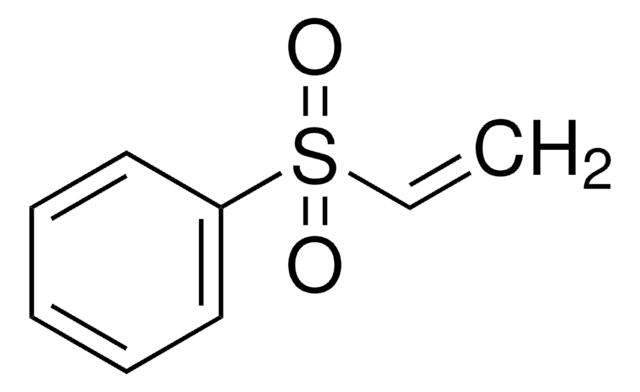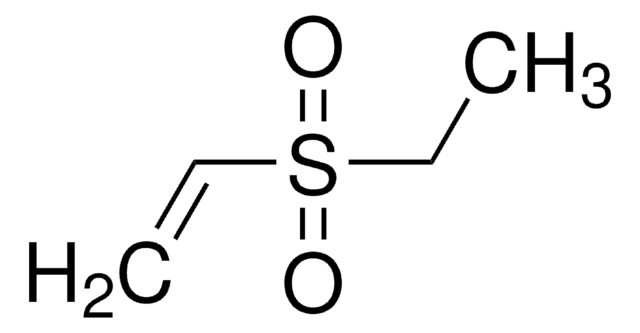340855
Glutaraldehyde solution
50 wt. % in H2O
Synonym(s):
Glutaric dialdehyde solution, Pentane-1,5-dial
About This Item
Recommended Products
vapor density
1.05 (vs air)
Quality Level
vapor pressure
15 mmHg ( 20 °C)
form
liquid
concentration
50 wt. % in H2O
technique(s)
electron microscopy: suitable
immunoblotting: suitable
immunohistochemistry: suitable
color
colorless
refractive index
n20/D 1.42
mp
-21 °C ((-6 °F))
solubility
water: soluble
density
1.106 g/mL at 25 °C
suitability
suitable for microfluidics/nanofluidics
application(s)
cell analysis
genomic analysis
life science and biopharma
sample preparation
SMILES string
[H]C(CCCC([H])=O)=O
InChI
1S/C5H8O2/c6-4-2-1-3-5-7/h4-5H,1-3H2
InChI key
SXRSQZLOMIGNAQ-UHFFFAOYSA-N
Looking for similar products? Visit Product Comparison Guide
General description
Glutaraldehyde is capable of efficiently crosslinking amine and hydrazine derivatives to proteins and other amine-containing polymers. Notably, in certain reactions, biotin hydrazides have been directly coupled to nucleic acids using glutaraldehyde, presenting a potential utility in conjugating fluorescent hydrazides and hydroxylamines to DNA. In histology studies, Glutaraldehyde is also employed to preserve tissue sections and prepare them for closer examination.
Application
- To compose the fixative solution (Glutaraldehyde + Paraformaldehyde + NaPO4) for use in high-resolution light microscopy and electron microscopy studies.
- To study the conjugation of goat anti-horseradish peroxidase with alkaline phosphatase by a reported method.
- To compose the primary fixative, which is employed to protect the deterioration of cytoplasmic features of yeast cells during permanganate fixation.
Features and Benefits
- Versatile and adaptable for wide variety of research applications
- Ready-made solution reduces the need for preparation time
Other Notes
comparable product
Signal Word
Danger
Hazard Statements
Precautionary Statements
Hazard Classifications
Acute Tox. 3 Inhalation - Acute Tox. 4 Oral - Aquatic Acute 1 - Aquatic Chronic 2 - Eye Dam. 1 - Resp. Sens. 1 - Skin Corr. 1B - Skin Sens. 1 - STOT SE 3
Target Organs
Respiratory system
Supplementary Hazards
Storage Class Code
6.1A - Combustible acute toxic Cat. 1 and 2 / very toxic hazardous materials
WGK
WGK 3
Regulatory Listings
Regulatory Listings are mainly provided for chemical products. Only limited information can be provided here for non-chemical products. No entry means none of the components are listed. It is the user’s obligation to ensure the safe and legal use of the product.
EU REACH SVHC Candidate List
Choose from one of the most recent versions:
Already Own This Product?
Find documentation for the products that you have recently purchased in the Document Library.
Customers Also Viewed
Related Content
Three-dimensional (3D) printing of biological tissue is rapidly becoming an integral part of tissue engineering.
Three-dimensional (3D) printing of biological tissue is rapidly becoming an integral part of tissue engineering.
Three-dimensional (3D) printing of biological tissue is rapidly becoming an integral part of tissue engineering.
Three-dimensional (3D) printing of biological tissue is rapidly becoming an integral part of tissue engineering.
Our team of scientists has experience in all areas of research including Life Science, Material Science, Chemical Synthesis, Chromatography, Analytical and many others.
Contact Technical Service







